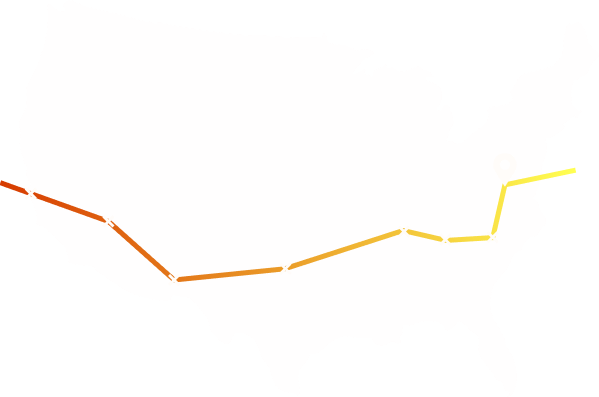Utilities Cost in Wilson, NC: Complete Guide for 2025
Understanding the utilities cost in Wilson, NC is crucial for budgeting your new life in this charming eastern North Carolina city. Unlike many areas where residents deal with multiple private utility companies, Wilson offers something unique: a comprehensive municipal utility system that often translates to better service and more predictable costs. Whether you're relocating from another state or moving within North Carolina, knowing what to expect from your monthly utility bills can help you plan your budget effectively and avoid any surprises after you settle in.
This comprehensive guide breaks down everything you need to know about Wilson, NC, utility bills, from average monthly costs to the setup process for new residents. We'll explore Wilson's distinctive municipal electric service, water and sewer rates, and provide practical tips for managing your utility expenses in your new home.
Average Monthly Utility Costs in Wilson, NC
Electricity Costs
Wilson residents enjoy competitive electricity rates thanks to the city's municipal electric system. The average monthly electric bill for a typical 1,200 square foot home ranges from $95 to $130, depending on the season and usage patterns.
During peak summer months when air conditioning runs frequently to combat eastern North Carolina's humidity, expect bills to reach the higher end of this range or even climb to $150-$180 for larger homes near areas like Country Club of the South or the spacious properties around Wilson Hunt High School.
Wilson's municipal electric utility operates more efficiently than many investor-owned utilities serving surrounding areas like Rocky Mount or Nashville, often resulting in rates that are 10-15% lower than neighboring communities served by private companies.
The city's electric department, headquartered downtown near the Wilson County Courthouse, provides reliable service with fewer outages and quicker restoration times compared to regional averages. Winter heating costs vary depending on your home's heating system, but electric heating typically adds $40-$80 to monthly bills during the coldest months, whether you're living near Barton College or in the newer subdivisions around Wilson Medical Center.
Water and Sewer Costs
Wilson, NC, water costs follow a tiered pricing structure that rewards conservation while ensuring adequate revenue for system maintenance. The base rate for residential customers includes the first 2,000 gallons, with additional usage billed at increasing rates. Most households can expect monthly water and sewer bills between $45 and $75, with larger families or those with irrigation systems potentially seeing bills up to $120.
The city's water treatment facilities consistently meet or exceed federal standards, and the municipal system investment means residents enjoy high-quality water without the markup typical of private utility companies. Sewer charges are typically calculated as a percentage of water usage, making conservation efforts doubly beneficial for your budget.
Natural Gas Costs
Natural gas availability in Wilson varies by neighborhood, with some areas served by regional providers while others rely on propane for heating and cooking. Where natural gas service is available, average monthly bills range from $35-$50 during moderate weather, increasing to $80-$120 during peak winter months. Many Wilson residents in areas without natural gas infrastructure use propane, which typically costs more per BTU but offers greater control over usage and delivery scheduling.
Wilson's Municipal Utilities: What Makes Them Special
Wilson, North Carolina, utilities stand out because the city operates its own electric, water, sewer, and broadband systems. This municipal ownership model provides several advantages that directly benefit residents' wallets and daily lives. Unlike investor-owned utilities that must generate profits for shareholders, Wilson's municipal utilities focus primarily on providing reliable service at cost-effective rates.
The city's Greenlight broadband service, integrated with the electric system, offers high-speed internet at competitive rates while generating revenue that helps subsidize other municipal services. This innovative approach to utility management has made Wilson a model for other cities considering municipal utility systems.
Customer service through Wilson Municipal Utilities tends to be more responsive and locally focused. When issues arise, you're dealing with city employees who live in the community rather than call center representatives in distant locations. Billing disputes, service requests, and emergency responses all benefit from this local accountability and investment in community satisfaction.
The municipal system also provides greater rate stability. While private utilities must navigate regulatory approval processes for rate increases and often face pressure to maximize profits, Wilson's rates are set through local government processes with direct community input and oversight.
Utility Setup Process for New Wilson Residents
Before You Move
Planning your utility setup Wilson NC should begin at least two weeks before your move-in date. The city's utility department recommends contacting them as soon as you have a confirmed moving date to ensure seamless service activation.
Required documentation includes:
- Valid photo identification (driver's license or state ID)
- Proof of occupancy (lease agreement or closing documents)
- Social Security number for credit check processing
- Previous utility account information (if transferring service)
Expected deposit amounts:
- Electric service: $50-$150 (varies by credit history and home size)
- Water and sewer services: $75-$125
- Excellent credit customers may qualify for waived deposits
- Limited credit history may result in higher deposit requirements
The utility department accepts various forms of payment for deposits and setup fees, including cash, check, money order, and major credit cards. Online account setup is available through the city's website, streamlining the process for tech-savvy newcomers.
Essential Contacts and Information
Wilson's Municipal Utilities Department, located on Goldsboro Street near the historic downtown courthouse, serves as your primary contact for electric, water, and sewer services. Their customer service team operates during regular business hours with emergency support available 24/7 for urgent issues like power outages or water main breaks. The department's convenient location makes in-person visits easy for residents throughout the city, from the Arts Council area to neighborhoods near Barton College.
For natural gas service where available, particularly in areas around Wilson Medical Center and toward the Bypass, residents need to contact the regional provider serving their specific area. Propane users, especially those in rural areas near Wilson-Lee Airport or toward the Nash County line, should research local suppliers and compare delivery rates and service options before making a selection.
Move-in Day Utility Checklist
On moving day, plan to arrive at your new home with confirmation numbers for all utility services and the contact information readily available. Most services activate automatically on your scheduled date, but having backup contacts ensures quick resolution if any issues arise.
Move-in day checklist:
- Test all electrical outlets and light switches throughout the home
- Check water pressure at faucets, showers, and outdoor spigots
- Verify gas appliances are functioning properly (if applicable)
- Take initial meter readings and photos for reference
- Document any issues and contact utility providers immediately
- Locate main shut-off valves for water and gas systems
Taking initial meter readings and photos serves as reference points for your first bills and helps resolve any potential billing discrepancies that might arise during your first few months in Wilson.
Factors Affecting Your Wilson Utility Costs
Home Size and Type
Your housing choice significantly impacts monthly utility expenses in Wilson. Single-family homes typically have higher utility costs than apartments or condominiums due to larger square footage and individual responsibility for all utilities. A 900 square foot apartment might average $60-$85 monthly for electricity, while a 2,500 square foot single-family home could see bills of $150-$220 during peak seasons.
Older homes in Wilson's historic neighborhoods often have less efficient insulation and windows, potentially increasing heating and cooling costs by 20-30% compared to newer construction. However, these homes often feature higher ceilings and better natural ventilation, which can reduce cooling needs during mild weather.
Seasonal Variations
Wilson's climate creates distinct seasonal patterns in utility usage. The summer months from June through September typically see the highest electric bills due to air conditioning needs. High humidity levels mean air conditioners work harder to maintain comfortable indoor conditions, sometimes running continuously during heat waves.
Winter heating costs depend largely on your home's heating system and insulation quality. Heat pumps, common in Wilson, provide efficient heating in moderate temperatures but may require backup electric heat during the coldest snaps, temporarily increasing usage. Spring and fall offer the most affordable utility months, with many residents seeing bills drop 30-40% during these moderate seasons.
Usage Patterns and Lifestyle
Work-from-home arrangements, increasingly common since 2020, can increase Wilson, NC utility bills by 15-25% as homes require heating, cooling, and electricity throughout traditional work hours. Families near Wilson Preparatory Academy or Hunt High School often see higher water usage and longer peak electricity usage periods due to larger household sizes and active teenagers.
Energy-efficient appliances and LED lighting can substantially reduce monthly costs for homes throughout Wilson, from downtown lofts near the Arts Council to family homes in Forest Hills. Many Wilson residents living in areas around Gillette Park and the Wilson Community College vicinity report saving $20-$40 monthly after upgrading to ENERGY STAR appliances and modern HVAC systems. Smart thermostats and programmable systems help optimize usage patterns, especially beneficial for residents with predictable schedules working at major employers like Wilson Medical Center or Barton College.
Wilson Neighborhoods and Utility Cost Variations
Downtown Wilson apartments near the historic Antique Capital of the South district often have lower individual utility costs due to shared walls and smaller spaces, but may lack individual control over heating and cooling systems.
Historic buildings along Nash Street and Tarboro Street sometimes have higher costs due to older infrastructure and less efficient systems, though their charm and walkability to restaurants like The Flame Catering & Banquet Center often offset utility premiums.
- Suburban neighborhoods like Forest Hills and areas around Wilson Community College typically offer the best balance of space and efficiency, with modern electrical systems and better insulation standards.
- Homes near Gillette Park and the neighborhoods surrounding Wilson Medical Center often have the most predictable utility costs, making budget planning easier for new residents who want proximity to healthcare and recreational amenities.
- Newer subdivisions on the West Wilson often feature energy-efficient appliances, double-pane windows, and modern HVAC systems, which allow residents to save noticeably on electricity and heating costs compared to older homes downtown.
- Properties located on the outskirts near major highways such as I-95 and US-264 may face slightly higher utility expenses. Larger lot sizes and detached homes typically require more energy for heating and cooling, though the added privacy and space appeal to many families.
New construction neighborhoods near Forest Hills Country Club and developments around Wilson Hunt High School often feature the latest efficiency standards and smart home capabilities. These areas attract families seeking modern amenities while maintaining reasonable utility expenses.
Money-Saving Tips for Wilson Residents
Energy Efficiency Programs
According to the North Carolina Department of Energy Quality, about utilities' energy efficiency guidelines, residents can access various rebate programs for upgrading appliances and improving home efficiency. The city periodically offers rebates for ENERGY STAR appliances, programmable thermostats, and insulation improvements. These programs help offset the initial cost of efficiency improvements while reducing long-term utility expenses.
North Carolina's weatherization assistance program provides additional support for qualifying households, offering free energy audits and efficiency improvements. This state-sponsored program can significantly reduce utility costs for eligible residents while improving home comfort year-round.
Solar panel installation is supported through net metering policies outlined by the North Carolina Utilities Commission, allowing Wilson residents to generate their own electricity and potentially reduce monthly electric bills to minimal connection fees.
Budget-Friendly Strategies
Wilson Municipal Utilities offers budget billing options that spread annual costs evenly across twelve months, making financial planning easier and avoiding seasonal bill spikes. This service typically uses the previous year's usage to calculate monthly payments, with an annual adjustment to account for actual usage differences.
Peak usage management involves shifting electricity use away from high-demand periods, typically late afternoons and early evenings during summer months. Running dishwashers, washing machines, and other high-energy appliances during off-peak hours can reduce strain on the system and keep your bills lower.
Simple conservation measures can reduce monthly costs by 10-20% without sacrificing comfort:
Easy money-saving strategies:
- Adjust thermostats by 2-3 degrees during peak seasons
- Use ceiling fans to improve air circulation and reduce AC load
- Ensure proper insulation around windows and doors
- Run dishwashers and washing machines during off-peak hours
- Replace incandescent bulbs with LED lighting throughout the home
- Unplug electronics and chargers when not in use
- Use programmable thermostats to optimize heating and cooling schedules
These simple changes help Wilson residents maintain comfortable homes while keeping utility costs manageable throughout the year.
For our Cost of Living in Wilson, NC analysis, utilities represent one of the most favorable categories compared to state and national averages, making Wilson an attractive destination for cost-conscious relocators.
Planning Your Moving Budget: Utility Deposits and Setup Costs
New Wilson residents should budget $200-$400 for utility deposits and connection fees, depending on credit history and service requirements.
Typical setup costs breakdown:
- Electric service deposits: $50-$150
- Water/sewer deposits: $75-$125
- Connection fees per utility: $25-$75
- Same-day or expedited service fees: Additional $50-$100
- Total estimated setup costs: $200-$400
First-month utility costs usually run higher than typical monthly averages due to partial-month charges, deposits, and initial usage as you settle into your new home. Budget an additional 25-50% above normal monthly estimates for your first utility bills to avoid surprises.
Professional moving companies like Smart Move understand these financial considerations and can help you plan your relocation budget comprehensively, ensuring you account for all utility-related expenses in your moving timeline and financial preparation.
Connection fees for new service typically range from $25-$75 per utility, with same-day or expedited service sometimes available for additional fees. Planning ahead usually eliminates expedited charges and ensures service activation aligns with your move-in schedule.
Conclusion
Understanding the utilities cost in Wilson, NC provides a significant advantage when planning your relocation to this vibrant eastern North Carolina community. Wilson's municipal utility system offers residents reliable service, competitive rates, and local accountability that's difficult to find elsewhere. From average monthly costs of $180-$280 for a typical household to the unique benefits of city-owned electric and broadband services, Wilson provides exceptional value for utility services.
Ready to make Wilson, NC, your new home? Smart Move specializes in helping people relocate smoothly. Our experienced team understands the local landscape and can help coordinate every aspect of your move, from utility planning to settling into your new neighborhood.
Request a free moving quote today and discover how we can make your transition to Wilson stress-free and affordable.



